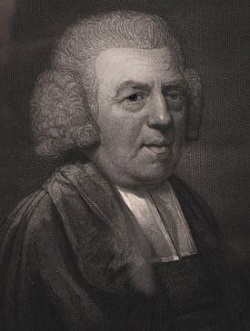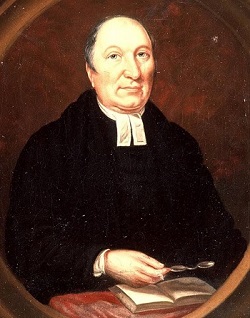


John Newton
John Newton, celebrated for his timeless hymn: Amazing Grace, penned the preface to a concise 12-page booklet offering a window into the revival that swept through Bala, Wales, in the autumn of 1791. In this preface, Newton lent his endorsement to the revival, undercutting the arguments of detractors who inevitably arise during such spiritual awakenings.
Groundwork for the Revival
In 1773, at the age of 18, Thomas Charles (1755-1814) was born again under the preaching of Welsh Evangelist Daniel Rowlands. After becoming ordained in 1778, Charles commenced his ministry in Bala, Wales. It was in Bala where he had invited impoverished children into his home for instruction. As the number of children increased, Charles’ home became inadequate, leading him to accept the use of the Calvinistic Methodist Church to accommodate his classes.

Thomas Charles
Charles provides us with this information about the spiritual and educational condition of North Wales during this era:
► Many parts of North Wales never had the Gospel clearly presented.
► The knowledge of God or the Bible was rare.
► With this spiritual ignorance, immorality and ungodliness prevailed.
► In many communities, not “one person in twenty was capable of reading.”
In 1785, Charles began organizing Circulating Schools, aiming for widespread literacy among the populace to enable reading of the Bible, thereby facilitating more effective evangelism.
Twenty years later, reflecting on his efforts in training teachers and establishing schools, he said:
Through the schools and the preaching of the gospel the spread of divine knowledge is become universal.
It was through the investment of much time and personal finances that Charles prepared the ground for this 1791 revival. It is little wonder that it was predominantly children, ages 6-12, who received the greatest blessing from this revival.
Initiator of the Revival
There was a “wild, vain young woman” from Bala, whose conversion experience seemed to have initiated the revival. After she came under severe conviction of sin, fearing eternity in her lost and sinful state, her “soul distress” was so acute that she lost all physical strength and was confined to her bed for three weeks.
Thomas Charles made a visit to her home, and in time she had a dramatic soul-saving experience. Charles relates the following about this occurrence:
In his [God’s] own good time, he graciously removed the bitter cup, and filled her soul with strong consolations, and joy unspeakable: he set his prisoners free, and gave her the garment of praise for the spirit of heaviness. This case struck awe and terror into the minds of many.
It was on the first and second Sundays in October that Charles said were “weeks ever to be remembered by me.” He said that it was in the Chapel, following the Sunday evening service, that “the Spirit of God seemed to work in a very powerful manner on the minds of great numbers present.”
And it was in individuals:
Who never appeared before to seek the Lord’s face; but now, there was a general and a loud crying, ‘What must I do to be saved,’ and, ‘God be merciful to me a sinner.’
Charles then wrote about what transpired around 9 or 10 o’clock that evening:
There was nothing to be heard from one end of the town to the other, but the cries and groans of people in distress of soul. And the very same night, a spirit of deep conviction, and serious concern, fell upon whole congregations in this neighborhood, when calling upon the name of the Lord.
Prayer Meetings
The following week, there was a focus on prayer and continual discussions on eternal topics. The spirit of conviction fell upon everyone and spread rapidly, mostly among the young people and children.
The Revival Spread
With no letup, the revival’s power spread from one town to another, and throughout the entire region.
A dispensation so glorious, I never behold, nor indeed expected to see in my day. In the course of eight years I labored in this country, I have had frequent opportunities of seeing, and feeling also, much of the divine presence in the Lord’s work and ordinances, and great successes, attending the ministration of the word; but nothing to equal the present work.
The coming of the Lord amongst us has been with such majesty, and irresistible power, that even his avowed enemies would be glad to hide themselves somewhere, from the brightness of his coming.
Charles writes of a fair in Bala that had an altered atmosphere due to the revival’s influence in that town:
At a large fair, kept here a few days ago, the usual reveling, the sound of music, and vain singing, was not to be heard in any part of the town; a decency in the conduct, and sobriety in the countenances, of our country people, appeared the whole of that fair, which I never observed before.
From letters written by Thomas Charles, we glean the following information about this revival:
► During the autumn of 1791, there was a “very great, powerful, and glorious out-pouring of the Spirit of God.”
► This out-pouring affected everyone in general, but especially affected the children and young people.
► The conviction of sin was so deep and powerful, that in some instances, individuals were “brought to the brink of despair and confined to their beds, without any other complaint.”
► People had a heightened awareness of the day of judgment and their respective conditions.
► “Those who were foremost in wickedness and rebellion, are now some of the foremost in crying for mercy, and seeking salvation.”
► Dozens of the “wildest and most inconsiderate of our young people, of both sexes, have been awakened.”
► The young people were previously involved in “vain diversions and amusements” but left that for spiritual matters.
► Worldly entertainment from music was “not only in danger, but entirely destroyed and abolished.”
► “The stoutest hearts” have been bent in submission, and the “hardest melted down with fire from heaven.”
► Once converted to Christ, their feelings of security in Christ became equally as strong.
► Everywhere one went, the topic of conversation was spiritual matters.
► Preaching the Gospel became easy, with the word of God flowing with power.
► “Little children, from six to twelve years of age, are deeply affected, astonished, and overpowered with divine truths. Their minds, day and night, are filled with nothing else. They talk of them when awake in their beds, and dream of them in their sleep.”
► There was a great transformation in the lives of the people involved.
► There was a renewed or great love for and delight in the Word of God.
► There was an increase in prayer.
► The outpouring of the Holy Spirit was said to have lasted but a few weeks, but the preaching of the Word retained its power, producing fresh awakenings in individuals.

The Spread of the Revival
The influence of this revival was witnessed in Caernarfon and all of Anglesey. Attendance at churches was “very numerous” and “very large.” Thousands would gather to hear sermons, “with earnestness and attention,” with “Awakenings” frequently happening.
The news of the Bala Revival spread throughout all of Wales and beyond. This news brought tremendous expectation, with churches said to be “in labor,” awaiting the conversion, or birth, of many new babes in Christ.
Status of the Revival a Year Later
A letter documenting the revival, found in The Christian’s Magazine and presumably written by Thomas Charles, dated January 26, 1792, indicates the following:
The work still continues its progress with great power and glory. New conquests are made, and fresh captives are continually brought in, and those in general, the most wild and abandoned that we had in the neighborhood. I can hardly believe my eyes sometimes, when I see in our chapel those, who were the most faithful servants of Satan, weeping, in the greatest distress, under a sense of their sin and danger, and crying out for mercy. But these are the pleasing objects with which our eyes are continually gratified.
The Need for Repeated Revivals
Thomas Charles adds this commentary concerning the need for continual revivals:
I am persuaded, that unless we are favored with frequent revivals, and a strong powerful work of the Spirit of God, we shall, in a great degree, degenerate, and have only a ‘name to live.’ Religion will lose its vigor; the ministry will hardly retain its luster and glory; and iniquity will of consequence abound.
Sources
► 1700s: Welsh Methodist Revival by Beautiful Feet
► A Brief Account of the Life of Howell Harris by Howell Harris
► A Brief History of the Life and Labours of the Rev. T. Charles by Edward Morgan
► Griffith Jones: Revival’s Morning Star by Welldigger
► History of the Revivals of Religion in the British Isles by Mary Grey Lundie Duncan (Page 112)
► John Newton by Wikipedia
► Life and Times of Griffith Jones by David Jones
► Narratives of Revivals of Religion in Scotland, Ireland, and Wales by Anonymous
► The Christian’s Magazine by Timothy Priestly
► The Life of Howell Harris by Hugh J. Hughes
► The Life of the Rev. Thomas Charles by David E. Jenkins
► The Works of the Late Reverend and Pious Mr. Thomas Gouge by Thomas Gouge
► Thomas Charles by Wikipedia
► Two Letters, Giving an Account of a Revival of Religion in Wales by Thomas Charles
Return to List of Revival Stories
Chet & Phyllis Swearingen:
Office: (260) 920-8248
romans1015@outlook.com
Beautiful Feet
P.O. Box 915
Auburn, IN 46706

